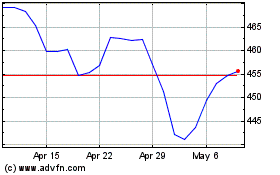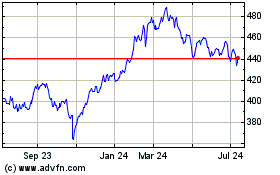Women in Charge: Mastercard Index Reveals How Countries are Progressing to Empower Women Entrepreneurs
March 07 2018 - 6:00AM
Business Wire
Call to action: Time to end gender bias against
women entrepreneurs around the world
Women entrepreneurs appear to thrive better in more developed
economies, findings from the second edition of the Mastercard Index
of Women Entrepreneurs (MIWE) revealed. Compared to their peers in
emerging markets, women business owners in developed ones are able
to draw from a greater pool of enabling resources and
opportunities, including access to capital, financial services and
academic programs.
Overall, the Index indicates that budding and established women
entrepreneurs around the world continue to progress despite
gender-related cultural biases that can create significant
roadblocks hindering them from advancing their businesses.
The Index tracks the progress and achievement of women
entrepreneurs and business owners across 57 markets spanning five
geographic regions – Asia Pacific, Europe, Latin America, the
Middle East and Africa, and North America.
“Women entrepreneurs have made remarkable strides as business
owners around the world, even as they work to achieve their full
potential. We believe that by drawing attention to their efforts,
we can further support and empower women in their drive to run
successful businesses and lead richer, more fulfilling lives,” said
Martina Hund-Mejean, Chief Financial Officer, Mastercard.
Mastercard Index of Women Entrepreneurs – Top 10 markets with
the strongest supporting conditions and opportunities for women to
thrive as entrepreneurs
- New Zealand – 74.2
- Sweden – 71.3
- Canada – 70.9
- United States – 70.8
- Singapore – 69.2
- Portugal - 69.1
- Australia – 68.9
- Belgium - 68.7
- Philippines – 68.0
- United Kingdom – 67.9
The Index indicates developed markets with strong enabling
conditions are not immune to cultural bias against female
entrepreneurship. In New Zealand, results revealed that the society
is less receptive towards female entrepreneurs. Despite these
circumstances, women business owners in New Zealand have risen
above the challenge, pulling their market to the top – and for the
second year running.
The Index also suggests that the opportunity for
entrepreneurship is not necessarily aligned to the pace of a
market’s economic development. Emerging economies such as Ghana
(46.4 percent) - one of the Index’s three newly added markets along
with Malawi and Nigeria - Uganda (33.8 percent) and Vietnam (31.3
percent) were found to have higher women business ownership rates,
compared to more developed ones. Women in these markets are deemed
as necessity-driven entrepreneurs, spurred by a need for survival
despite their lack of financial capital and access to enabling
services.
Women business owners as a percentage of all business owners
– Top 10 markets
- Ghana – 46.4%
- Russia – 34.6%
- Uganda – 33.8%
- New Zealand – 33.0%
- Australia – 32.1%
- Vietnam – 31.3%
- Poland – 30.3%
- Spain – 29.4%
- Romania -28.9%
- Portugal – 28.7%
“Ahead of International Women’s Day, we hope the study’s
findings can serve as a timely reminder for governments and
organizations to bolster support provided to budding and working
women business owners across all areas, from greater financial
inclusion and wider access to education,” said Ann Cairns,
President, International Markets, Mastercard.
Key insights:
- What do successful businesses survive
on? A powerful combination of access to financial services and
products; ease of doing business; strong support for SMEs and
quality governance, as seen in New Zealand (74.2 points,
1st), Sweden (71.3, 2nd),
Canada (70.9, 3rd), the United States
(70.8, 4th) and Singapore (69.2,
5th), which took the top five spots on the
Index.
- Entrepreneurship is seen as a ticket to
opportunity for women, as shown in markets like Philippines
(68.0, 9th), Botswana (66.5,
14th), Thailand (65.8,
15th), Poland (65.4, 19th)
and Costa Rica (65.0, 20th). Although
supporting conditions for entrepreneurs in these markets are not as
conducive, they have a strong representation of female business
leaders, professionals and technical workers, a vibrant local
entrepreneurship landscape, and high regard for the status of
successful entrepreneurs.
- Korea (53.2 to 57.2,
44th) tracked the biggest improvement in Index
score, driven by a surge in entrepreneurial activities. The growth
of the Korean female business landscape may have been fueled by
positive perceptions of successful women executives and the set-up
of a task force for gender parity.
- The progress of women entrepreneurs was
held back by one or more obstacles in nearly all of the 57
economies covered. These obstacles are largely caused by
perceptions of gender bias, which contribute to poor social and
cultural acceptance, lack of self-belief and access to financial
funding or venture capital.
- In fact, a lack of self-belief can be
especially potent in deterring women from starting their own
businesses. In markets like Belgium (25.5%,
22nd), Germany (25.3, 24th),
and the United Kingdom (25.0, 27th) the
percentage of female business ownership in the market is lower than
expected, despite having efficient regulatory systems and high
access to resources.
- However, a will always forges a way. In
necessity-driven markets such as Indonesia (62.4,
30th), Ghana (61.5, 33rd),
Brazil (61.1, 35th), Mexico (60.2,
38th), Uganda (57.6, 43rd)
and Nigeria (56.4, 45th), women are as likely
as men to engage in entrepreneurship. Such enterprises are likely
to be in the informal sector, are less-technologically intensive,
small in scale and assume the form of self-employment.
- Although markets in the Middle East and
Africa region such as United Arab Emirates (49.5,
49th), Tunisia (45.2, 51st)
and Saudi Arabia (39.3, 54th) may have tracked the
some of the lowest scores in the Index, they also report the
highest average growth expectations among women at 37%. Over half
of women entrepreneurs in the UAE and Tunisia expect to hire 6 or
more employees in the next 5 years. Women in Saudi Arabia are more
likely than men to have these ambitions to grow their
businesses.
The full report is available here.
– End –
Methodology
The Mastercard Index of Women Entrepreneurs tracks female
entrepreneurs’ ability to capitalize on opportunities granted
through various supporting conditions within their local
environments and is the weighted sum of three components: 1)
Women’s Advancement Outcomes (degree of bias against women as
workforce participants, political and business leaders, as well as
the financial strength and entrepreneurial inclination of women),
2) Knowledge Assets and Financial Access (degree of access women
have to basic financial services, advanced knowledge assets, and
support for small and medium enterprises), and 3) Supporting
Entrepreneurial Conditions (overall perceptions on the ease on
conducting business locally, quality of local governance, women’s
perception of safety levels and cultural perception of women’s
household financial influence).
The Index uses 12 indicators and 25 sub-indicators to look at
how 57 economies across Asia Pacific, Middle East & Africa,
North America, Latin America and Europe - representing 78.6 percent
of the world’s female labor force - differ in terms of the level of
the three components.
About Mastercard
Mastercard (NYSE:MA), www.mastercard.com, is a technology
company in the global payments industry. Our global payments
processing network connects consumers, financial institutions,
merchants, governments and businesses in more than 210 countries
and territories. Mastercard products and solutions make everyday
commerce activities – such as shopping, traveling, running a
business and managing finances – easier, more secure and more
efficient for everyone. Follow us on Twitter @MastercardNews, join
the discussion on the Beyond the Transaction Blog and subscribe for
the latest news on the Engagement Bureau.
View source
version on businesswire.com: http://www.businesswire.com/news/home/20180307005173/en/
Mastercard CommunicationsAlyssa Rosenblatt,
914-249-1569Alyssa.rosenblatt@mastercard.comorGeorgette Tan, +65
6390 5971georgette.tan@mastercard.com
MasterCard (NYSE:MA)
Historical Stock Chart
From Mar 2024 to Apr 2024

MasterCard (NYSE:MA)
Historical Stock Chart
From Apr 2023 to Apr 2024
